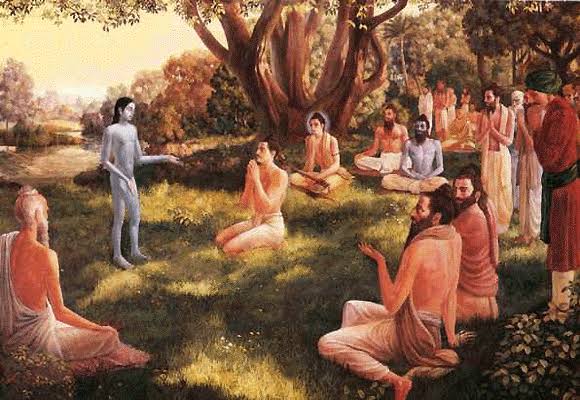
The Spiritual Journey of Sukadeva: Lessons from the Mahabharata
Introduction:
The Mahabharata, an ancient Indian epic, is not only a tale of great wars and heroic deeds but also a treasure trove of profound teachings and spiritual insights. One such incident within the epic involves the sage Vedavyasa and his son Suka, highlighting the themes of renunciation, spiritual maturity, and the interconnectedness of all beings. This article explores the narrative and the teachings we can derive from it.
The Yearning for Renunciation:
In the Mahabharata, Vedavyasa's son, Suka, expresses a deep yearning for a life of seclusion and renunciation, despite not having undergone the sacred thread ceremony that traditionally marks the initiation into Vedic studies and associated duties. Suka's desire to lead a life of detachment from worldly affairs signifies the importance of inner spiritual development and the pursuit of higher truths.

Detachment and Spiritual Maturity:
Suka's decision to embrace a life of renunciation at a young age showcases his spiritual maturity and his understanding that true fulfilment lies beyond the material world. By renouncing secular and religious obligations, Suka demonstrates the importance of detaching oneself from external expectations and focusing on the inner journey towards self-realisation.
The Distress of Separation:
When Vedavyasa witnesses his son Suka leaving, he experiences distress at the thought of being separated from him. This emotional reaction highlights the innate bond between a parent and child and emphasises the universal experience of attachment. Vedavyasa's anguish serves as a reminder that even on the spiritual path, attachment can pose challenges and hinder personal growth.
The Trees' Response:
Instead of Suka responding to his father's call, it is the trees in the vicinity that seem to respond on his behalf. This mystical occurrence symbolises Suka's profound connection with all living beings, including nature. It underscores the interconnectedness of all existence and suggests that spiritual seekers who attain a higher state of consciousness can perceive the unity underlying the diversity of life.

Teachings and Lessons:
- The pursuit of spiritual growth: Suka's decision to lead a life of renunciation from a young age teaches us the importance of inner development and seeking spiritual truths beyond worldly achievements.
- Detachment from external expectations: Suka's detachment from secular and religious duties reminds us to focus on our personal spiritual journey rather than being driven solely by societal expectations.
- Universal interconnectedness: The response of the trees signifies the inherent oneness of all beings. It encourages us to cultivate compassion, empathy, and a sense of unity with all of creation.
- Transcending attachments: Vedavyasa's distress at separation serves as a reminder to examine our own attachments and identify how they may hinder our spiritual progress. Letting go of attachments and embracing detachment can lead to inner freedom and growth.
Conclusion:
The narrative of Vedavyasa and Suka in the Mahabharata provides profound insights into the themes of renunciation, spiritual maturity, and interconnectedness. It reminds us of the importance of inner growth and the need to detach ourselves from external expectations. By understanding these teachings and applying them in our own lives, we can embark on a transformative spiritual journey, seeking a deeper connection with ourselves and the world around us.
By Mamta Rajbhar
(The images used in this blog post are not owned by Anime Devta, they are just to help the readers)

